Case Law Details
Dharam Singh Vs PCIT (ITAT Delhi)
In the case of Dharam Singh vs PCIT, the ITAT Delhi adjudicated on the exercise of revisionary power under section 263 of the Income-tax Act, 1961. The case involved allegations by the PCIT that the Assessing Officer (AO) had not conducted adequate inquiries during the assessment, prompting revision proceedings.
The appellant, Dharam Singh, contested the invocation of revisionary powers, arguing that the AO had diligently conducted inquiries, including scrutiny of cash deposits during demonetization and disclosure of scrap sales. The AO had issued multiple notices and questionnaires, and had obtained relevant documents and statements. However, the PCIT insisted that crucial inquiries were overlooked, such as the scrutiny of bank statements and the audit report.
The ITAT reviewed the sequence of events and documentation presented during assessment. It noted that the AO had indeed conducted comprehensive inquiries, documented in meticulous detail in the order-sheets and supported by replies from the assessee. These inquiries encompassed not only cash deposits and scrap sales but also extended to VAT returns and profitability analysis.
Contrary to the PCIT’s assertions, the ITAT found substantial evidence that the AO’s inquiries were thorough and exhaustive. The assessment order, therefore, did not meet the criteria of being both erroneous and prejudicial to revenue interests, as required under section 263 of the Act. The ITAT emphasized that revisionary powers cannot be exercised based solely on perceived inadequacies in inquiry without concrete evidence.
Conclusion: Based on the detailed examination of facts and legal precedents, the ITAT Delhi concluded that the PCIT’s invocation of section 263 was unjustified. The assessment order was upheld as valid, and the revisionary order was quashed. This case reaffirms the importance of substantiating claims of inadequate inquiry with factual evidence before invoking revisionary powers.
FULL TEXT OF THE ORDER OF ITAT DELHI
Captioned appeal has been filed by the assessee assailing order dated 04.03.2022 passed by learned Principal Commissioner of Income Tax (PCIT), Bareilly, purportedly under section 263 of the Income-tax Act, 1961 (in short ‘the Act’) pertaining to assessment year 2017-18.
2. Grounds raised by the assessee are apparently challenging the jurisdiction of learned PCIT in invoking jurisdiction under section 263 of the Act to revise the assessment order.
3. Briefly the facts are, the assessee is a resident individual and stated to be engaged in manufacturing and trading of agricultural implements, such as, harrow, thrasher, cultivator etc. The assessee maintains regular books of account and such books of account have been subjected to statutory audit under section 44AB of the Act.
4. Be that as it may, for the assessment year under dispute, the assessee filed his return of income on 20.06.2017 declaring income of Rs.7,98,864/-. Assessee’s case was selected for scrutiny to verify “large turnover shown in Income Tax Return, but Audit Report not filed”. The Assessing Officer issued notices under sections 142(1) and 143(2) of the Act from time to time calling upon the assessee to furnish various details. As observed by the Assessing Officer, in response to such notices, the assessee furnished replies, documents, books of account, bills and vouchers etc., which were verified on test check basis. While verifying the books of account and documents filed by the assessee, the Assessing Officer made the following disallowances:
| (i)
|
Disallowance of car running and repair & maintenance expenses | Rs. 8,839/-
|
| (ii) | Disallowance of Depreciation | Rs.83,923/- |
5. After making addition of disallowances noted above, the total income was determined at Rs.8,91,626/-. Accordingly, the assessment was completed under section 143(3) of the Act. After completion of assessment, as aforesaid, learned PCIT called for and examined the assessment records. While doing so, he was of the view that in course of assessment proceedings, the Assessing Officer has not verified/examined certain issues, such as, cash deposited in the bank account during the demonetization period and the taxability of scrap sales of Rs.7,46,000/-. He further observed that in course of assessment proceedings, the assessee did not furnish Form 3CA of the Audit Report. Whereas, without taking Form 3CA on record, the Assessing Officer completed the assessment. Thus, he was of the view that the Assessing Officer, having not examined/inquired into the aforesaid issues, assessment order is erroneous and prejudicial to the interest of Revenue. Therefore, he issued a show-cause notice under section 263 of the Act, requiring the assessee to explain as to why the assessment order should not be revised. In response to the show-cause notice, the assessee furnished a detailed reply objecting to the initiation of proceedings under section 263 of the Act. It was the say of the assessee that at the time of assessment proceedings, since, the Assessing Officer has made a detailed inquiry with regard to the cash deposited during demonetization period, the assessment order cannot be treated as erroneous and prejudicial to the interest of Revenue on the ground that the Assessing Officer has not examined the issue.
6. As far as non-disclosure of income from scrap sales, the assessee submitted that since the amount in dispute has been disclosed by the assessee, there is no question of non-disclosure. Learned PCIT, however, was not convinced with the submissions of the assessee. He observed that as per Explanation 2 to Section 263 of the Act, the revisionary authority can exercise jurisdiction under section 263 of the Act, if he is of the view that the Assessing Officer has passed the assessment order without making inquiries or verification which he should have made. Thereafter, relying upon certain judicial precedents, learned PCIT ultimately concluded that the Assessing Officer, having not examined the issues discussed by him, the assessment order is erroneous and prejudicial to the interest of Revenue. Accordingly, he proceeded to set aside the assessment order with a direction to the Assessing Officer to frame the assessment de novo after providing reasonable opportunity of being heard to the assessee. 7. Reiterating the stand taken before learned PCIT, learned counsel for the assessee submitted, in course of assessment proceedings, the Assessing Officer has specifically inquired into the cash deposits made by the assessee in his bank accounts during the financial year relevant to the assessment year in dispute. In this context, he drew our attention to the notices issued under section 142(1) of the Act along with the questionnaire attached to such notices. He submitted, in response to the queries raised in the notices and questionnaire, the assessee furnished reply along with documentary evidences from time to time starting from 27.02.2019 and thereafter. In this context, he took us through all the notices issued under sections 142(1)/143(2) of the Act and the replies given in response thereof. He submitted, the Assessing Officer, in fact, has conducted thorough inquiry not only with regard to the cash deposits made during demonetization period, but all other issues raised by the revisionary authority in the notice issued under section 263 of the Act. He submitted, insofar as the allegation of learned PCIT that the assessee has not furnished the Audit Report in Form 3CA during the assessment proceedings and non-disclosure of scrap sales etc. are concerned, these are frivolous issues as Form 3CA is not applicable to the assessee and so far as receipts from scrap sales are concerned, the assessee has disclosed them in its audited financial statements.
8. He submitted, the Assessing Officer, in fact, has recorded the details of inquiry conducted by him in course of assessment proceedings and the result of such inquiry in the order-sheet maintained in the assessment record. In this context, he drew our attention to the copies of the order-sheets placed in the paper-book. He submitted, the questionnaire issued by the Assessing Officer, replies by the assessee along with documentary evidences and the order-sheet entries clearly establish the fact that in course of assessment proceedings, the Assessing Officer has conducted full-fledged inquiry not only with regard to cash deposits in the bank account, but various other issues. He submitted, without properly examining the materials on record, learned PCIT has recorded an erroneous finding of fact that in course of assessment proceedings the Assessing Officer has not examined the issue of cash deposits in the bank accounts by calling for the cash books, bank statement etc.
9. He submitted, learned PCIT has also erroneously noted that the assessee has not filed his Audit Report along with his return and without examining it the Assessing Officer has accepted the trading results shown in the Income Tax Return. He submitted, the aforesaid finding of fact by learned PCIT is contrary to facts and materials on record as the assessee had submitted the audit report in course of assessment proceedings. Thus, he submitted, power under section 263 of the Act has been exercised without properly examining the materials on record, which according to him, vitiates the proceedings. He submitted, when the materials on record reveal that the Assessing Officer has conducted thorough inquiries on the issues and after verifying all materials brought on record has passed the assessment order, then such order cannot be treated as erroneous and prejudicial to the interest of Revenue. He submitted, Explanation 2 to section 263 of the Act does not authorize the revisionary authority to declare the assessment order as erroneous and prejudicial to the interest of Revenue by merely observing that in the opinion of the revisionary authority the Assessing Officer has not conducted inquiry, which he should have made. He submitted, before applying Explanation 2 to section 263 of the Act, the revisionary authority must prove on record that the Assessing Officer has not conducted necessary inquiry. He submitted, since, in the facts of assessee’s case the Assessing Officer has conducted detailed inquiry on all the issues, including the issue on which the proceeding under section 263 of the Act was initiated, the assessment order cannot be held as erroneous and prejudicial to the interest of Revenue, so as to empower the revisionary authority to revise it.
10. Per contra, learned Departmental Representative strongly relied upon the observations of learned PCIT.
11. We have considered rival submissions and perused the materials on record. We have also applied our mind to the judicial precedents relied upon by the parties. However, in our view, the issue is purely factual. This is so because, learned PCIT has invoked his jurisdiction under section 263 of the Act to revise the assessment order, alleging that the Assessing Officer has not made inquiry with regard to the cash deposits made during demonetization and further he has not examined non-disclosure of income from scrap sales.
12. Before we proceed to examine the validity of exercise of jurisdiction under section 263 of the Act, being the last fact finding authority, it is necessary for us to factually verify the nature of inquiry conducted by the Assessing Officer in course of assessment proceedings. From the materials placed before us, it is observed that after assessee’s case was selected for scrutiny, the Assessing Officer on 11.08.2018 issued a notice under section 143(2) of the Act, calling upon the assessee to produce the evidences on which he may like to rely to support the return of income filed for the assessment year under dispute. On 04.09.2018, the Assessing Officer issued a notice under section 142(1) of the Act along with a questionnaire raising queries on various issues and calling upon the assessee to furnish his reply on the issues raised along with supporting evidences. In item nos. 6 to 10 of the questionnaire attached to the notice issued under section 142(1) of the Act, the Assessing Officer had specifically called upon the assessee to furnish the bank account statements and cash deposits made in the bank account from 01.04.2016 to 31.03.2017 in a specific format and also to explain the source of such cash deposits. In the said questionnaire, the Assessing Officer has also called upon the assessee to furnish details of month-wise sales and purchases. He has further called upon the assessee to explain substantially high volume of purchases compared to low profit rate declared for the year.
13. He had also called upon the assessee to furnish the VAT return filed for the relevant financial year with details of stock inventory. On 16.01.2019, the Assessing Officer issued another notice under section 142(1) of the Act calling for identical information. Additionally, he has also brought it to the notice of the assessee that since the assessee had failed to furnish the Audit Report as required under section 44AB, the penalty proceedings under section 271B would be initiated. In response to the said notice, the assessee furnished its reply by providing all necessary information relating to the details of bank accounts held, cash deposits made during the year with the source thereof. It was explained by the assessee that the cash deposits made in the bank account were out of cash sales. The assessee also furnished the month-wise purchase/sale statements along with VAT returns. The assessee also explained the substantially high purchase turnover and reasons for low profit. Even, the assessee furnished its audited financial statement as required under 44AB of the Act. Subsequently, the Assessing Officer issued more notices under section 142(1) of the Act from time to time calling for various other details and the assessee furnished its reply with supporting documents.
14. As could be seen from the materials placed on record, beginning from 11.08.2018 to 07.06.2019, a period of almost one year, the Assessing Officer has conducted thorough inquiry by issuing a notice under section 143(2) as well as notices under section 142(1) of the Act with questionnaire calling upon the assessee not only to furnish the details of cash deposits in the bank account, but also explain the source thereof. The Assessing Officer has also called upon the assessee to explain the reason for low profit compared to the turnover. It is a matter of record that the assessee has responded to each of the queries raised by the Assessing Officer in the questionnaire by explaining the source of cash deposits as well as various other details called for. Not only the Assessing Officer has conducted threadbare inquiry on various issues by issuing number of notices to the assessee, but he has also conducted discreet inquiries from third parties, including the banks, wherein, the assessee has held account by issuing notices under section 133(6) of the Act. The result of such inquiries has been meticulously noted down by the Assessing Officer in the order-sheet maintained in the assessment record. Extracts of the order-sheet entries maintained by the Assessing Officer in the assessment record are reproduced hereunder for better clarity:
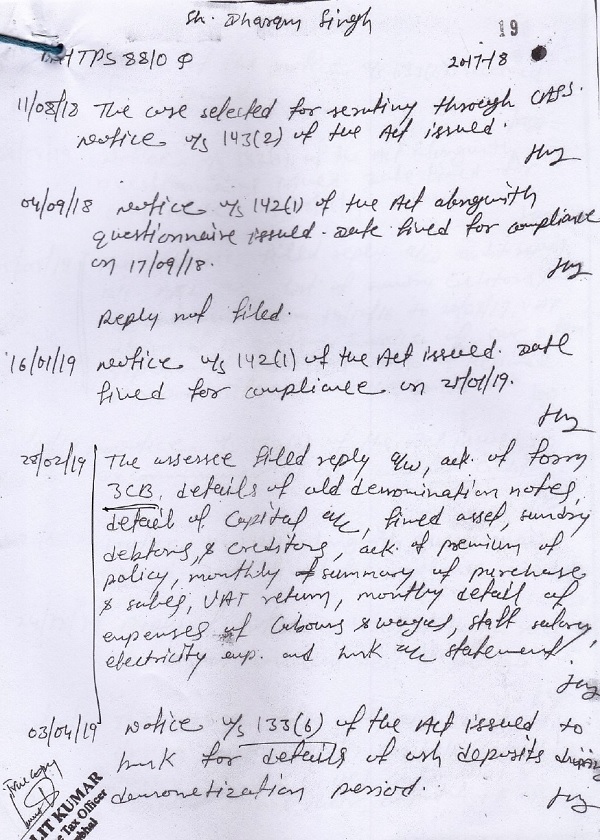
–
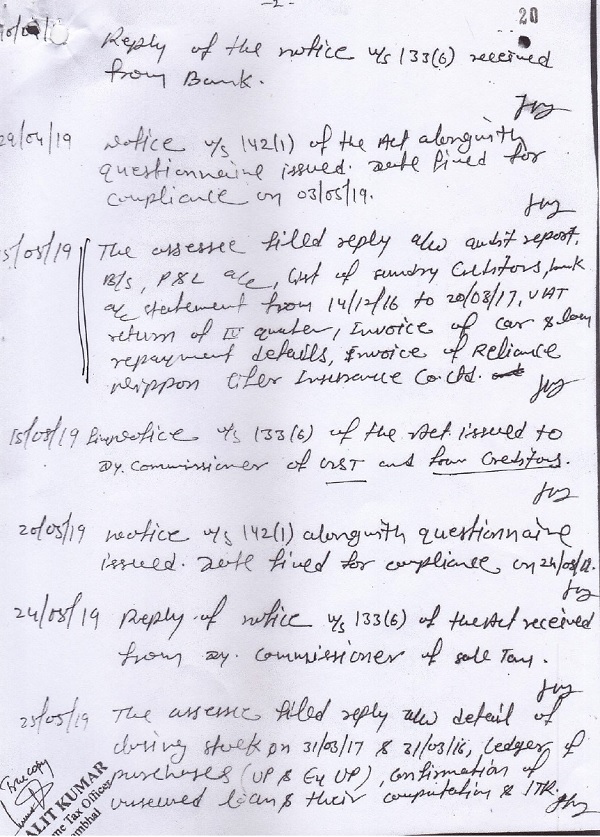
–
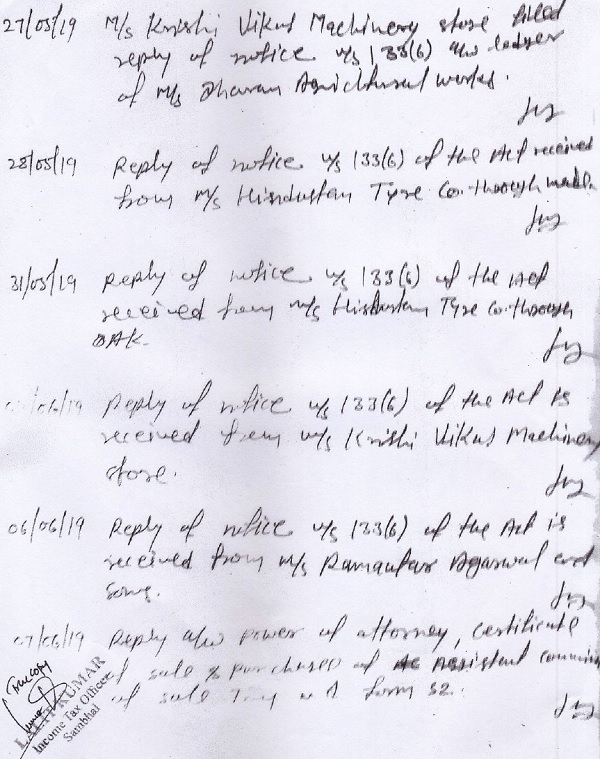
–
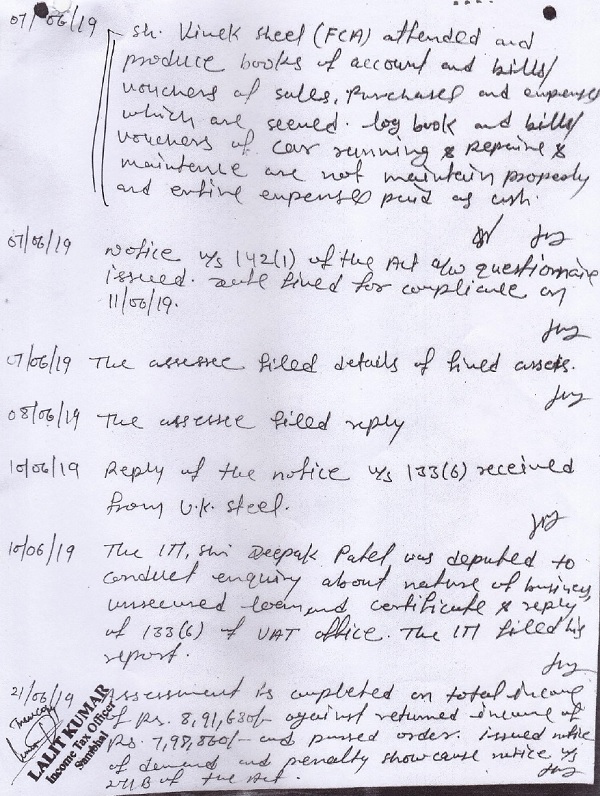
–
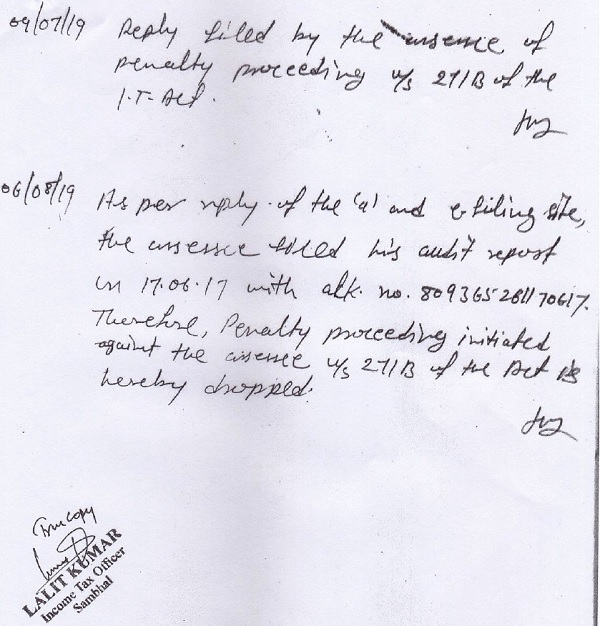
15. Perusal of the order-sheet entries reproduced above, provide a clear insight to the detailed inquiry conducted by the Assessing Officer to ascertain not only the source of cash deposits made in the bank account, but various other issues, which came up for consideration in course of assessment proceedings. The order- sheet entries further reveal that to verify authenticity of assessee’s claim that the cash deposits made in the bank accounts were out of cash sales, the Assessing Officer has taken up inquiry with the parties, from whom, the assessee claimed to have made purchases. He has also sought information from Commissioner of Sales Tax, Deputy Commissioner of GST, creditors, concerned banks etc. Thus, in sum and substance, facts on record reveal that the Assessing Officer has conducted deep inquiries on various issues including deposits made in the bank account during the previous year, which also includes the demonetization period. In contrast, in the show-cause notice issued under section 263 of the Act, learned PCIT has observed as under:
“NOTICE FOR THE HEARING
M/s/Mr/Ms
Subject: Notice for Hearing in respect of Revision proceedings u/s 263 of the THE INCOME TAX ACT, 1961-Assessment Year 2017-18.
In this regard, a hearing in the matter is fixed on 11/02/2022 at 12:08 PM. You are requested to attend in person or through an authorized representative to submit your representation, if any alongwith supporting documents/information in support of the issues involved (as mentioned below). If you wish that the Revision proceeding be concluded on the basis of your written submissions/representations filed in this office, on or before the said due date, then your personal attendance is not required. You also have the option to file your submission from the e-filing portal using the link: incometaxindiaefiling.gov.in Please refer to the above,
2. The case record for the A.Y. 2017-18 was called for and examined by the undersigned. The undersigned considers that the assessment for the A.Y. 2017-18, which was completed u/s 143(3) of the Income Tax Act 1961 on 21.06.2019 at total income of Rs.8,91,630/- is erroneous in so far as it is prejudicial to the interest of the revenue on the following grounds :-
On perusal of assessment record, it has been observed that during the year under consideration, the assessee is engaged in the business of “Agro-based industries” and deposited cash during demonetization period (from 09.11.2016 to 31.12.2016) amounting Rs. 91,00,000. Assessee had also availed C.C. Limit of Rs. 1.75 Cr from the bank. On perusal of assessment record, it is observed that cash book and bank account statements from the assessee were not been obtained and copy of bank accounts for the relevant period not placed on file. It means that huge cash deposits made by the assessee were not been examined. Assessee had not filed his audit report along with his ITR, but trading results declared by the assessee in his ITR were accepted.
As per Profit and Loss account, Sales by the assessee was shown at Rs. 11,09,59,501. A copy of “scrap sales” account placed on records shows sale at Rs.7,46,000. Further, the assessee had also not collected the tax at source (TCS) on scrap sales under provision of section 206 of the I.T. Act, 1961, In Form No. 3CD in Colmn. No. 34 (a) “Whether the assessee is required to deduct or collect tax as per provision of Chapter XVII-B or Chapter XVII-BB, if yes please furnish” was filled as “NIL”.
Perusal of assessment record depicts the details of G.P. and N.P. from A.Y. 2015-16 to 2017-18 as under:-
| A.Y | G.P.% | Net Profit (in Rs.) | N.P. % |
| 2015-16 | 2.23% | 6,43,737 | 0.53% |
| 2016-17 | 3.42% | 7,35,682 | 0.69% |
| 2017-18 | 3.14% | 9,13,366 | 0.83% |
On perusal of above chart, it is observed that the scrap sales amounting Rs.7,46,000/- has not been included in the sales.
2. Thus, during the course of assessment proceedings, the Assessing Officer has not examined/enquired into the facts of the case. “
16. As could be seen from the highlighted portion of the show-cause notice reproduced above, learned PCIT has observed that on perusal of assessment record, he found that the cash book and bank account statements from the assessee were not obtained and copy of bank account for the relevant period not placed on file. These facts led him to conclude that the cash deposits made by the assessee were not examined by the Assessing Officer. If the aforesaid observations of learned PCIT are kept in juxtaposition to the order-sheet entries of the Assessing Officer as well as the questionnaires along with notices issued under section 142(1) of the Act and replies furnished by the assessee, there can be two conclusions. Firstly, without making any inquiry the Assessing Officer has misstated the facts and made false entries in the order-sheets. Secondly, learned PCIT has not examined the records properly. Keeping in view the details of inquiry conducted by the Assessing Officer, which is manifest from the materials brought on record in the form of notices issued under section 142(1) and 143(2), the order-sheet entries, replies filed by the assessee, it is not possible under any circumstances to conclude that the Assessing Officer has misstated the facts or has recorded false order-sheet entries. Therefore, the only conclusion one can reach is, the allegations made by the PCIT that the Assessing Officer has not conducted any inquiry with regard to cash deposits during demonetization period, is not based on materials on record, or rather, contrary to materials on record. The materials on record certainly make it clear that learned PCIT has initiated proceedings under section 263 of the Act mechanically without properly examining the assessment records. Even, with regard to the alleged non-disclosure of scrap sales, the materials on record clearly reveal that there, in fact, is no such nondisclosure of scrap sales. The Audited financial statement furnished in course of assessment proceedings clearly indicate that the scrap sales, indeed, were shown by the assessee.
17. The primary conditions for invoking section 263 of the Act are, the order sought to be revised must be erroneous and at the same time prejudicial to the interest of Revenue. Unless, these twin conditions are satisfied, section 263 of the Act cannot be invoked. In the facts of the present case, learned PCIT has put much emphasis on Explanation 2 to section 263 of the Act. In our view, Explanation 2 to section 263 of the Act does not invest unbridled power with the revisionary authority so as to empower him to invoke revisionary jurisdiction arbitrarily. The words appearing in Explanation 2(a) to the effect that “the order is passed without making inquiries or verification which could have been made”, certainly do not mean that on mere allegation that in the opinion of the revisionary authority the Assessing Officer has not made inquiries or verifications which should have been made, revisionary power can be invoked. Allegation of lack of enquiry by the Assessing Officer has to be substantiated based on record and cannot be conjured out of thin air.
18. In the facts of the present appeal, the materials brought on record clearly reveal that the Assessing Officer has conducted thorough inquiry on various issues, including the issues on which learned PCIT has exercised jurisdiction under section 263 of the Act. After satisfying himself with the result of enquiry, the Assessing Officer has completed the assessment. That being the factual position emerging on record, the assessment order cannot be held to be erroneous and prejudicial to the interest of Revenue merely on the allegation that the Assessing Officer has not made inquiry and verification with regard to cash deposits as well as scrap sales. In absence of any material brought on record by the revisionary authority to establish the lack of inquiry, mere allegation would not suffice.
19. Thus, on overall consideration of facts and materials on record, we are of the view that exercise of jurisdiction under section 263 of the Act in the present case is invalid, hence, unsustainable, as the assessment order cannot be held to be erroneous and prejudicial to the interest of Revenue. Accordingly, we quash the impugned order passed under section 263 of the Act and restore the assessment order.
20. In the result, the appeal is allowed.
Order pronounced in the open court on 18th June, 2024





